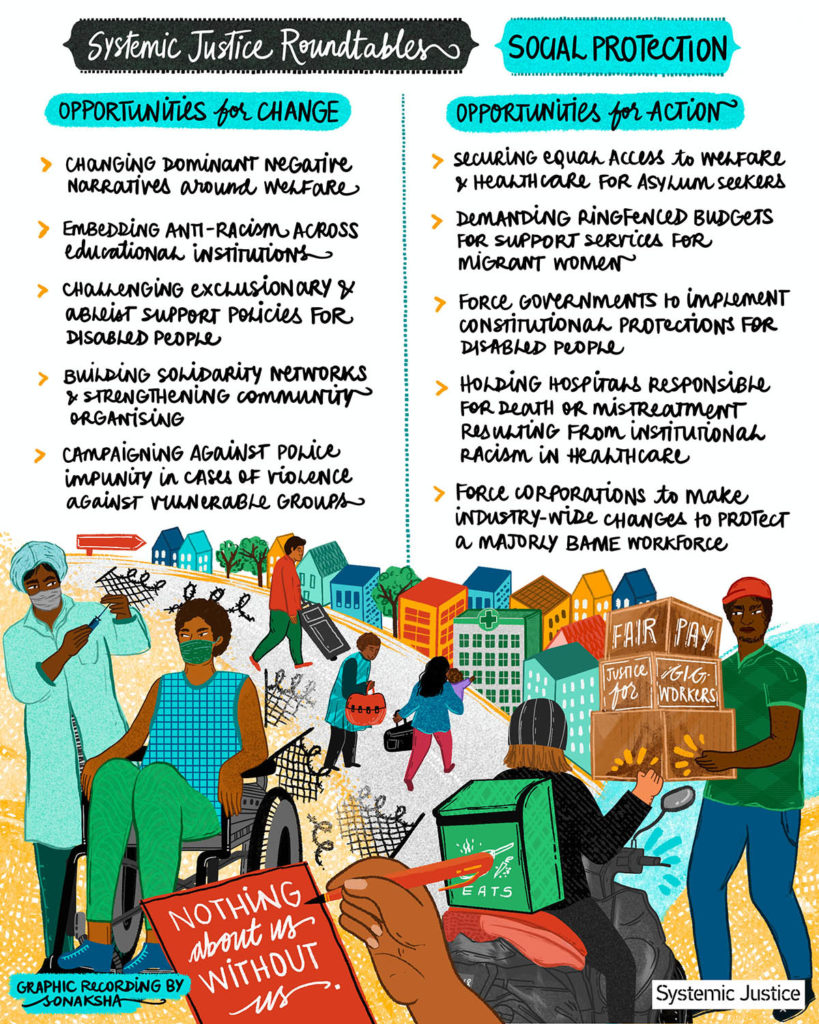“Our battle is much more than pain and suffering. Strategic fights can make change happen that sometimes even the legal system doesn’t foresee.”

When utilised properly, social protection frameworks can help protect people against poverty and exclusion, and help shield individuals in times of crisis. It can help improve health and education, facilitate access to food, water, and shelter, and overall further equality and economic growth. In practice, things look very different.
The conversations at our roundtable on social protection last week showed that, increasingly, social protection is being denied as a deliberate strategy of exclusion against those who are politically underrepresented and those who belong to groups and communities that are systemically prejudiced against as undeserving or ineligible for governmental assistance and support. Much of the burden to address essential needs for marginalised and racialised people ends up with (civil) society. As one participant noted: “Governments promote the rescue industry.” This dangerous shift is harmful, with a political disdain for the dignity of the most marginalised and vulnerable across our societies. This can lead to the most extreme of consequences: death. Yet, “Governments deny any accountability towards welfare by treating each person’s death individually, without looking for patterns or at the context.”
Across the multitude of topics that were discussed amongst the 16 activists in the roundtable from across Europe, ranging from (mental) healthcare, housing and employment to schooling, women’s shelter, and migration, two strands were consistently visible.
First, that people’s identities resulted in compounding discrimination. Marginalised groups either fall through the gaps of any existing support networks due to not being entitled to access services, or they receive poor support because of institutional racism. For those who “fall through the net”, discrimination remains a factor in what assistance they can get from individuals or civil society. This results in unequal distribution of support: “The government is not taking any action, so it has boiled down to relying on the goodwill of people for social protection. And that leaves a lot of room for discrimination.” This is further exacerbated for people with multiple intersecting identities, such as queer racially minoritised people.
In some cases, these inequalities in accessing support are weaponised by governments. One example of “biopolitical surveillance” is the creation of a further hostile environment for queer migrants by requiring a regular negative HIV test to maintain residence rights. But the impact is also felt in the private sector, where in the so-called “gig economy” drivers and couriers who are predominantly Black and Asian migrants are unprotected by the trade industry they work in, and face severe, at times fatal, violence from the public in the course of their work.
A second strand was that existing legal protections are not being enforced in a meaningful way, if at all. “We are told that we have equality, but in court we don’t” one participant commented. Many examples were flagged in the discussions, including abortion rights, disability protection, housing rights, freedom of movement, and the right to culture. In addition, the inadequacy of existing systems was a central point of critique. These included measures being insufficiently powerful: “Employers get away with violations because they have deep pockets, sanctions and fines aren’t enough!” said one participant, but also deeper reflections on the system being set up to fail marginalised groups more generally. “The current legal framework protects a system of privileges. We cannot legislate on migration without including migrants, or on issues of mental health without involving people affected” one of the activists reflected, echoing the “nothing about us without us” adage from the disability justice movement.
There was a rich exchange on opportunities for action, which included:
- Getting governments to ringfence budget for gender and LGBTQI+ specific services
- Holding authorities accountable for death or mistreatment resulting from institutional racism in health care services, such as neglect, non-consensual medication, and restraint methods
- Challenging legislation underpinning forced evictions of Roma communities and the criminalisation of their traditions
- Launching an independent inquiry to surface the cumulative patterns of how welfare reforms eventuate and result in death
- Breaking the pattern of impunity for violence against women*, Roma, and LGBTQI+ people
Though the issues discussed covered a broad spectrum, the interconnectedness between the challenges participants were taking on day to day was clear throughout the roundtable. There was a strong vision of solidarity across different struggles: “At the end of the day when we start talking about justice, we meet at the same point, because we all want justice for each other.” And, while the work yet to be done can seem overwhelming at times, there was a shared feeling that we can make change happen. “We might not change the entire world but maybe we can make a change for our neighbours” one participant commented, to which another added: “We are many and this is our biggest strength!”
